Paralympics: The perils of being a blind athlete
- Published
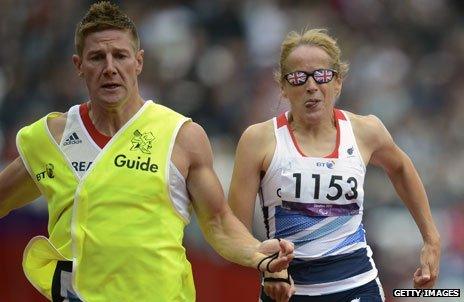
My first experiences of disability sport were pretty confusing, not to mention painful and slightly humiliating.
I lost my sight very suddenly aged 13 in 1984 and, before I could blink, or think, I was whisked away to a "special" boarding school for blind children in Worcester - 200 miles from my home.
I was told it would be good for me, especially as the school had a history of high achievers. In particular I was sold the benefits of their leisure and sporting facilities.
Braille books were put in front of me, a white cane was stuffed in my hand, and the hard rehabilitation work began.
After weeks of not being able to feel the difference between an S and a T in this annoying dotty feelable alphabet, I was pretty relieved, and intrigued, when it came to having my first PE lesson.
So, how does sports work with one teacher and 10 blind kids in a class?
I'm still not quite sure actually but we all trooped out onto the running track, with everyone cracking jokes and pushing each other, all seeing it as an entirely normal lesson - except me.
We were going to do a 100m sprint, I learned. But how do you run if you can't see? A fairly basic question which, seemingly, I was a bit too embarrassed to ask at that tender age. So I didn't.
We all lined up at the top of the track, and, as new boy, I was chosen to go first.
The teacher stood at the other end with a very loud megaphone. "OK Damon. On your marks, get set, go... "
I ran as hard and as fast as I could but something weird was happening. The teacher started shouting "five, five, five!".
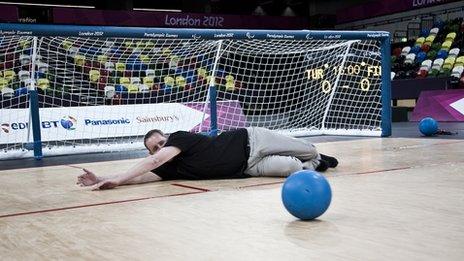
Sixes and sevens: Damon Rose tries his hand at Paralympics goalball
I didn't get it. Was he adding maths into our leisure curriculum?
"Five, five, five, six, six, six, seven!"
I must have been going impressively fast because I could no longer feel the track under my trainers.
"Eight, eight, eight, nine!" It was all happening at a dizzying pace and, was it my imagination or was I going slightly downhill?
"Nine, nine, nine, 10, 11, ditch, long grass, brambles... Whittington Road".
Everyone laughed loudly and, as the teacher unravelled me from the bushes, he explained his number shouting system.
"Did you not know? Five means you're running straight towards me, four means you've gone a little to the left, six means you're erring right." I'd gone off the scale.
In the build up to the Paralympics, we've been hearing about all sorts of rehabilitation in the form of sport.
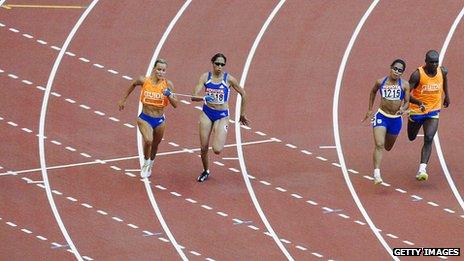
Threes and fours: Paralympics athletes running left
Stoke Mandeville hospital has its own stadium. Who would have imagined a hospital, of all places, would have one of those? The man who founded the Paralympics, Dr Ludwig Guttmann, forced his spinally injured patients to do sport for their own good.
Table tennis and archery were compulsory at one stage and some got so involved with it, they took it to another level.
In the 80s, back at my school, we played football with ball-bearings in it, goalball and a version of cricket - again with a rattling football, where the bowler had to bounce the ball twice so that a blind batsman would have a fair chance of working out where it was.
Having played regular sports when I could see, I was none too impressed at these adapted sports. They were slow and I thought them a bit "special".
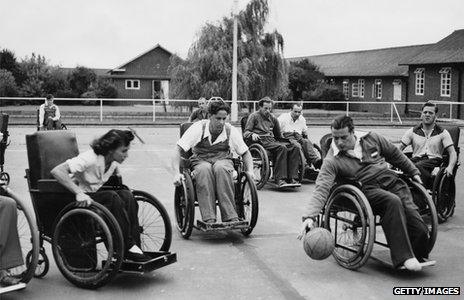
Guttman's work increased life expectancy for patients at Stoke Mandeville
Then everyone started talking about the Paralympics. It seemed that blind people could go in for them, not just the paralysed.
Having seen the once yearly special edition of We Are the Champions children's programme where disabled kids had a go at sports too, I remember feeling a bit embarrassed by it all.
As it had a pool, the school became a training camp for Paralympic swimmers. In our boarding house on the edge of campus, Sharon Davies's dad, one of the British swimming coaches, would come and stay to co-ordinate efforts and get the kids out of bed early to train.
By the Seoul games of 1988, I knew at least four of the Paralympians and, as the 1988-89 school year began, I had a bronze medalist in my class, a Paralympian with two silvers and a bronze in the class above me, and a couple of others competing.
"Let's have a look at your medal," we'd say to our classmates. They didn't make a fuss about it and nor did we really.
The Games weren't on the television back then and I still rather imagined Ron Pickering officiating over it all with the athletes all jumping in the pool and bouncing on inflatables afterwards.
It was very hard to take it all seriously when a significant percentage of my pals in the school coffee bar were Paralympians. From where I was looking on, it felt like any old disabled person could have a go.
But, of course, it wasn't me getting up at 05:00 to train and also trying to juggle my homework.
And it wasn't me trying to bulk up and remain healthy in order to gain a significant advantage over my Norweigian nemesis, who was always trying to pip me to the post.
I started to become aware of a disabled athlete called Tanni Grey who everyone was beginning to make a lot of fuss about. She kept appearing on TV and it felt like maybe she deserved the fame a bit. A decade later, I would find myself working with her for a little while.
When I left school, I rather left Paralympics and disability sport behind - except for an ill-fated attempt at getting a bunch of lads to play blind-folded football on a beach in Greece during a summer holiday. Two of them ended up in hospital with stitches.
Practice and training helps, I was beginning to realise. I wondered if I should have given my school pals a little more credit.
The 1988 to 1992 period, Seoul to Barcelona, is the point at which the Paralympic Games started to really get serious.
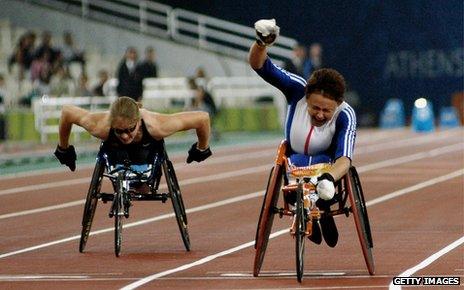
Tanni Grey-Thompson (right) celebrates at the Athens Paralympics, 2004
Seoul was the first Games to officially share the same city and venues as the Olympic Games, an arrangement which is due to continue until 2020 under the current agreement between the two organising committees, the IOC and IPC.
Nowadays, professional money is on the table. Compared with the Olympic athletes, there is less corporate sponsorship, but lottery funding is distributed and can allow for a lot of the Paralympic hopefuls to concentrate their efforts full time on their chosen sport.
GB's flag-bearer for 2012, quad tennis champ Peter Norfolk, spends some of his time running a wheelchair business and the blind football captain David Clarke is a senior partner in a London bank.
When I was at school, the Paralympics weren't nearly so glossy, shiny, visible and attractive as they are at London 2012.
At roughly the same time I left my institutionalised disability education bubble, the Paralympics drew a line under what is now loosely referred to by some as the "old era" of the Games.
Nowadays I'm not only incredibly impressed by the sportsmen and women, but I have been thinking about taking up sports myself. It no longer seems daft, it feels like a pretty cool thing to do.
- Published24 August 2012